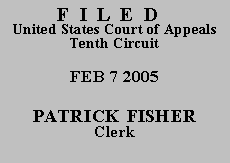

| CHARLES MASON LOEWE, |
|
| v. | |
| N.L. CONNER, Warden, Leavenworth Penitentiary, |
I. Background and Procedural History
This is a pro se 28 U.S.C. § 2241 appeal from the dismissal of a petition for habeas corpus relief brought by a federal prisoner. Charles Mason Loewe is currently in federal custody in the United States Penitentiary in Leavenworth, Kansas (USPLVN). Mr. Loewe alleges he has fully served his federal sentence and that for purposes of obtaining a parole hearing, he submitted an "Informal Request to Staff Member" form to prison officials in October 2002. Mr. Loewe claims to have received no response to this request, nor to subsequent letters directed to prison management. Mr. Loewe filed a habeas petition in the United States District Court for the District of Kansas, specifically contending that his attempts to exhaust administrative remedies were impaired by prison staff.
Before the district court, the respondents stated that Mr. Loewe is entitled to resubmit an informal request for a parole hearing and pursue administrative review thereafter if necessary. The district court concluded the matter should be dismissed without prejudice because "even if the court were to assume the truth of petitioner's assertion . . ., petitioner is unable to show any prejudice resulting from [prison staff's] failure to respond where petitioner was clearly advised and allowed to resubmit his informal request." Order, R. Doc. 17, at 3. Mr. Loewe appeals the district court's decision and seeks an order compelling the respondents to process his October 2002 request. We exercise jurisdiction pursuant to 28 U.S.C. §§ 1291 and 2253(a), and AFFIRM.
II. Analysis
We review the district court's dismissal of a § 2241 habeas petition de novo. Broomes v. Ashcroft, 358 F.3d 1251, 1255 (10th. Cir. 2004); Patterson v. Knowles, 162 F.3d 574, 575 (10th Cir. 1998).
Prior to seeking habeas relief under § 2241, federal prisoners must exhaust administrative remedies. Williams v. O'Brien, 792 F.2d 986, 987 (10th Cir. 1986) (per curiam). Mr. Loewe does not claim to have satisfied the exhaustion requirement. Rather, he contends that he was impaired in his efforts to exhaust administrative remedies by prison staff, preventing him from obtaining a parole hearing or, alternatively, from satisfying the exhaustion requirement prior to seeking habeas relief. Mr. Loewe argues that his October 2002 request for a parole hearing was ignored and that he was therefore "blocked" from administrative remedies. Appellant's Br. at 9.
This argument is untenable in light of the uncontested statement of the respondents that "petitioner may still seek [an] administrative remedy regarding his initial parole hearing issue by . . . following the same procedures he used [in other unrelated administrative appeals]." Response, Doc. 9, at 6. Even if Mr. Loewe's allegation that his October 2002 request was not processed properly, his ability to exhaust administrative remedies has not been impaired since he has the ability to resubmit his claim.
III. Conclusion
We agree with the district court that Mr. Loewe has failed to show any prejudice from his failure or inability to exhaust administrative remedies. Therefore, the judgment of the United States District Court for the District of Kansas is AFFIRMED.
Entered for the Court,
Michael W. McConnell
Circuit Judge
*.This order and judgment is not binding precedent, except under the doctrines of law of the case, res judicata, and collateral estoppel. The court generally disfavors the citation of orders and judgments; nevertheless, an order and judgment may be cited under the terms and conditions of 10th Cir. R. 36.3.